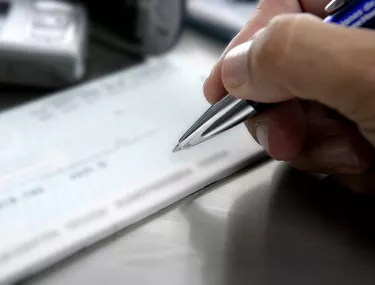
The availability of debit cards, electronic wallets and online bill paying services has made the use of paper checks less common, but checks can still be very useful when it comes to managing your bank account and your personal and household finances.
Consumers are usually offered the option of single or duplicate checks when they order paper checks for their bank accounts. Duplicate checks are a bit more expensive, but they can help check-writers manage their finances more effectively.
Video of the Day
Video of the Day
The Value of Paper Checks
Technology has made it more than easy for people to make payments and transfer funds electronically. Many individuals and businesses have stopped writing or using paper checks as a result. Debit cards, bill pay systems and bank drafts eliminate the hassle of carrying paper checks, writing them out to an individual or business and then waiting for the receiver to deposit the check so that the funds can be taken out of an account.
Payees no longer have to worry about whether a check will clear or bounce for insufficient funds. But paper checks do have some advantages over electronic payments, particularly for check-writers.
Tracking Payments
You can track a paper check more closely than other means of payment. You can monitor your account to determine when the check is cashed. The bank then provides you with a copy of the canceled check. Anyone who has paid with a paper check will be able to document if, when and how the check was cashed if there's a dispute about payment. They can identify the individual or business unit that was responsible for cashing the check.
The Challenge of Small Businesses
Some businesses don't accept credit or debit cards. They're increasingly rare, but they do still exist. One example might be a mom-and-pop landlord who owns just a few rental units and doesn't want to have to deal with processing credit or debit cards.
Payments to Utility Companies
Utility companies and some governments sometimes charge an extra fee for credit card or debit card payments, such as the City of Philadelphia for its water bills. But they'll accept paper checks by mail or at payment locations at no extra cost.
Single vs. Duplicate Checks
Paper checks are sold in checkbooks that include duplicate or single checks.
Single checks are simply a book of original checks that can be filled out and used as needed. Duplicate checks, sometimes also written as "cheque duplicate," pair each paper check with a thin piece of printed carbon paper that can't be torn from the pad, unlike the paper check.
The main difference is that the duplicate check is just a carbon copy or duplicate of the check that you've written. The details are imprinted on the carbon paper as you write out the top check. The carbon paper remains in the pad. You now have a copy of the paper check that includes all its details, including the date, the amount of the check, the check number and the name of the payee.
The carbon copy can't be taken to the bank and cashed, and it can't remit payment. It's just a copy of the check intended for your recordkeeping purposes.
You can buy regular checks for use with your checking account the next time you order checks, or you can opt to use a single/duplicate check system.
Personal Finance Recordkeeping
One problem that many people have had with paper checks in the past involves personal finance recordkeeping. Registering each check and calculating your resulting balance is critical to effectively managing a checking account. But the reality is that many people forget to enter each and every check they write into the check register. They neglect to calculate the balance after each deposit or withdrawal from the checking account.
Failure to track paper checks and to keep a paper record of withdrawals and deposits is a primary cause of bank overdrafts. The downside is that paper checks, including paid and canceled checks and duplicate checks, are a lot bulkier and more inconvenient to store than electronic records.
This is a particular problem for those who write paper checks because payees can take days, weeks or even months to deposit or cash checks. It's easy for the payor to forget about the check without a written record of the check payment, at least until the payee deposits it. This can lead to a bounced check/overdraft and unexpectedly depleted finances.
Duplicate checks provide a reminder of the paper copy of a written check, and they can make check-writing more convenient. If you write a check while you're in a hurry and you don't have time to add it and your balance information to your check register, you'll still have the duplicate to work from when you get home and you're able to update your register with your new balance.